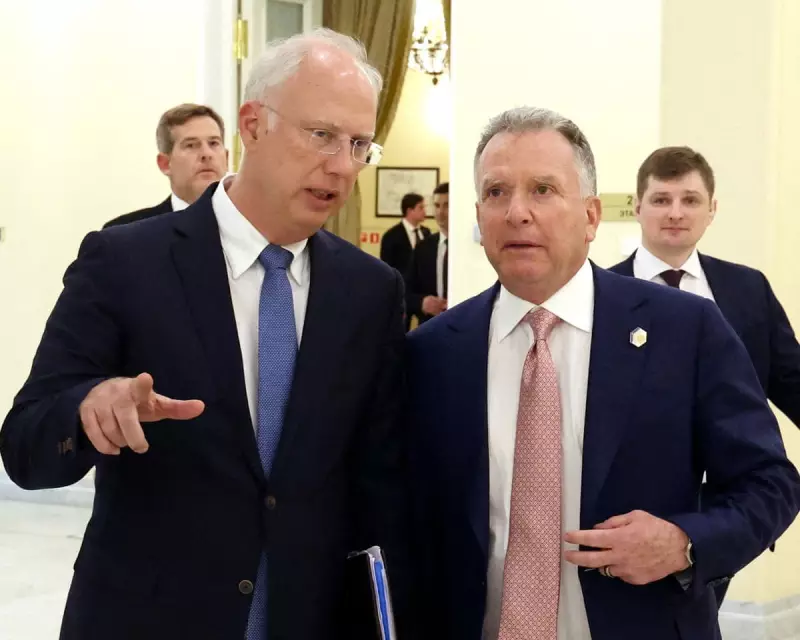
Trump Adviser Caught Coaching Russian Officials in Explosive Leak
A remarkable intelligence leak has exposed how a key adviser to former President Donald Trump provided coaching to Russian officials on the most effective ways to gain influence with the Trump administration. The intercepted communications reveal Steve Witkoff offering strategic advice to top Kremlin aides during a period of sensitive negotiations between the two nations.
The Content of the Intercepted Calls
Bloomberg News obtained and published audio from two separate phone conversations that provide unprecedented insight into the relationship between Trump associates and Russian officials. The first call featured Witkoff speaking directly with Yuri Ushakov, a senior aide in the Kremlin. The second conversation occurred between Ushakov and Kirill Dmitriev, who has been deeply involved in negotiations with the Trump White House.
Remarkably, the news organisation published its scoop without any byline or dateline, an unusual practice that suggests extraordinary measures were taken to protect the source of the sensitive material. Bloomberg stated it had "reviewed and transcribed audio" of both calls but provided no additional information about how the verification process was conducted.
Ushakov appeared to confirm the authenticity of the recordings during a Wednesday appearance, though he claimed portions were fabricated. He declined to comment on the remainder of the content, stating the calls were confidential and that leaking such discussions is "of course unacceptable." In an interview with Russian newspaper Kommersant, Ushakov suggested the conversations with Dmitriev and Witkoff may have occurred over WhatsApp, noting that "There are certain conversations on WhatsApp that, generally speaking, someone might somehow be able to listen to."
The Mystery of the Source
The publication of such sensitive intercepted material raises significant questions about which intelligence service or individual might have leaked the recordings. Daniel Hoffman, a former CIA Moscow station chief, acknowledged the difficulty in pinpointing the source, stating "It could be 100m different things, including somebody on the Russian side trying to hurt Witkoff's reputation."
Several potential sources have been suggested by intelligence experts:
- US Intelligence Agencies: Current or former members of the CIA or NSA who are dissatisfied with the administration's approach to Russia and Ukraine
- European Intelligence Services: Agencies alarmed by Witkoff's apparent pro-Russian stance in negotiations
- Ukrainian Intelligence: Officials concerned about Witkoff's role in discussions affecting their national security
- Russian Sources: Elements within the Kremlin seeking to damage Witkoff's reputation amid reported internal divisions
One former senior intelligence official noted that while numerous agencies could have intercepted the calls, the most probable source was someone within the US system. The fact that Bloomberg obtained actual audio rather than just a transcript or summary suggests the source was either directly involved in intelligence collection or held a senior position allowing access to raw intercepts.
Intelligence Implications and Fallout
The decision to leak such sensitive material represents a significant intelligence risk for whichever agency obtained it. As one former official explained, "It's completely unsurprising that any number of agencies might have got hold of this recording, but it's extremely surprising that someone would leak it." Publishing the intercepts would likely cause Ushakov to change his communication devices and habits, effectively closing a valuable intelligence channel.
The content of the calls confirms long-standing suspicions about Witkoff's closeness to Russian positions during negotiations. The leak comes amid reported divisions within the Kremlin elite regarding who should manage relations with the United States, adding another layer of complexity to an already tense diplomatic situation.
For Ukrainian officials, the revelations validate their concerns about Witkoff's role in negotiations, though the risk of damaging relations with the United States might have deterred them from conducting such an operation. The technical capability required to monitor a WhatsApp call occurring outside Ukrainian territory would also represent a significant achievement for their intelligence services.
The incident highlights ongoing tensions within US intelligence communities regarding the Trump administration's policies toward Russia and Ukraine, though leaking raw intercepted audio would represent an extraordinarily dangerous move for any disgruntled intelligence employee.





